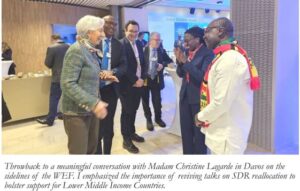Finance Minister, Ken Ofori-Atta has called for an all-hands-on-deck approach to addressing the climate financing gap that has left third world countries feeling the brunt of the long-term shifts in global temperatures and weather patterns.
He made the call at the Climate Vulnerable Forum (CVF) Leaders’ Investment Roundtable in Davos, Switzerland on January 16, 2024.
The event, part of the World Economic Forum (WEF), brought together world leaders, stakeholders, and finance experts to discuss sustainable investment strategies.
Speaking as the Chair of the V20, Minister Ofori-Atta presented the Finance Agenda for 2024, outlining key priorities in the face of a changing climate.
Central to his message was the urgent call to advance Climate Prosperity Plans (CPPs) and harness carbon financing as a crucial driver for just and equitable climate action.
“The V20’s primary goal is the advancement of the Climate Prosperity Plans and their associated pipelines. These plans are our strategic blueprint for mobilizing finance and investment in alignment with our broader development priorities and our domestic goals,” Minister Ofori-Atta stated.

Highlighting historical disparities in emissions, Minister Ofori-Atta underscored the pivotal role of carbon markets in redistributing resources between higher-emitting and climate-impacted nations. He commended the UAE’s commitment to purchasing African carbon credits, signaling a positive step towards global cooperation.
“Innovative project design is essential to maximize the impact of carbon markets. Projects funded through carbon financing should aim at reducing emissions and include elements of climate adaptation. This dual approach helps mitigate future climate risk while also enhancing the resilience of communities affected by its impacts,” he explained.
The Finance Minister also emphasized the transition to renewable energy as a fundamental element in the journey towards climate prosperity and economic resilience. Beyond environmental considerations, the shift from fossil fuels to renewable sources is positioned as a financial imperative, ensuring long-term stability and fostering sustainable economic growth.

“Our Finance Agenda for 2024 adopts a dynamic and comprehensive approach to addressing climate change and economic vulnerabilities, with a strong emphasis on partnerships with the private sector and philanthropic organizations,” Minister Ofori-Atta stated.
The Minister on the sidelines of the event met the President of the World Bank, Ajay Banga. Mr. Banga indicated that the World Bank was keen to consider Ghana’s DPO request of $300 million and $250 million support for the Financial Stability Fund. The first tranche of the DPO was has subsequently been approved by the World Bank, on January 23,2024.
Mr. Ofori-Atta also engaged the President of the European Central Bank, Madam Christine Lagarde, where he highlighted the need to bring back discussions on Special Drawing Rights (SDR) reallocation as a mechanism to support Lower Middle Income Countries.
The event also featured remarks from Ranil Wickremesinghe, President of Sri Lanka, who discussed Sri Lanka’s Climate Prosperity Plan and the critical need for innovative investment strategies.










